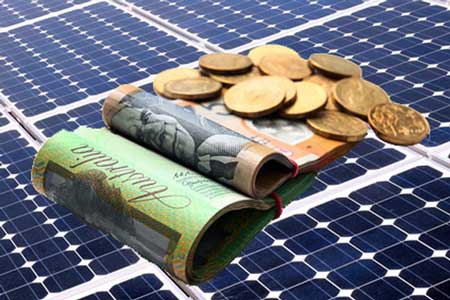Take 3 minutes to understand the economics of solar, you’ll be happy you did.

Generally solar skeptics make 2 mistakes in their hurried economic analysis of the viability of solar panel systems:
1) They are almost never take into account the real savings of solar because they misunderstand how solar power actually works with the grid.
2) They sum up the returns in a single "simple payback" figure. I would argue that this is a dumb way to measure an investment. Especially as it is often quoted at over double the actual payback because of reason (1) above!
To understand if solar energy is going to save you money or not, the most important thing to determine is the cashflow.
Let’s use easy numbers to illustrate this example. They are actually based on the savings I'm getting from my real-life solar system.
Bear in mind the following was written in 2015 – the economics of solar have gotten even better since due to increases in electricity costs and feed in tariffs and a decrease in the cost of systems and in term deposit interest rates.
I have a 6kW solar system that saves me around $1,900 per year on my electricity bills (through a combination of solar energy used in my home and the price I'm paid for exporting electricity back into the grid) – even with a crappy 8c net Feed-In Tariff!
At the time of writing, a typical 6kW solar system cost about $9,000 fully installed (2015). But let's call it $10,000 to make the maths easy. Most people believe that this means that the system 'pays itself off' in just over 5 years ($10k divided by $1,900 is just over 5 years). Further, it is commonly believed that you don't reap financial benefits from solar power until the system has paid for itself. This analysis is wrong on lots of levels!
What if I told you that if you don't have a solar system, you may actually be losing money every month? I realise that I’ve just descended into 'sleazy salesman' territory, but hear me out:
Most people either pay for solar panels out of savings or add it to their mortgage.
If you have $10,000 in the bank right now it is probably earning about 4% interest. Let’s call it 5% to make the maths easy.
Alternatively if you add $10,000 to your mortgage you are probably paying about 5% interest on it.
Either way you have an "opportunity cost" or "cost of finance" of 5%, ($500 per year) for your $10k solar system. That $500 per year cost is either extra repayments on your mortgage or lost interest on savings.
In my case I'm losing out on approximately $500 per year in interest… but I'm 'gaining' the $1,900 from savings on my electricity bill.
Imagine a machine where you put $500 in and got $1,900 out (some would say I’ve just described pokies, but they tend to take your $500 and give you nothing back). That’s what I’ve got on my roof. You gotta love solar!
Let me be clear – this is not financial advice: The numbers I've used in this example reflect the approximate savings I'm actually getting from my 6kW solar system. Your returns will depend on lots of things including how much electricity you consume, when you use it and what happens to interest rates in the future.
If you want to calculate your possible returns from solar – why not get an experienced installer to do the maths for you. You can get 3 detailed quotes from local installers I trust here.
